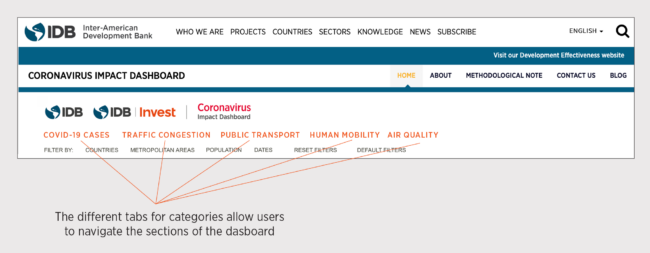The Coronavirus Impact Dashboard Toolbox includes publicly available data sources and open-source code to process Waze for Cities data. Together, these tools are the basis for a dashboard that shows the impact of social distancing measures on mobility in Latin America and the Caribbean since the onset of the coronavirus pandemic. The code can be replicated and reused in other ways to support data-driven decision-making.
Life around the world has changed dramatically since the onset of the coronavirus. But how do we measure these changes in order to support informed policymaking across a range of topics, including the impact of different quarantine measures on social distancing and the evolution of the pandemic? To shed light on these questions, the IDB and IDB Invest developed the Coronavirus Impact Dashboard. Since the dashboard’s launch, a range of variables have been tracked on it in order to provide Latin American and Caribbean policymakers, epidemiologists, and the general public with measures of the impact of the coronavirus outbreak on people’s behavior and economic activity.
To share our work on the dashboard, we have created a GitHub repository , so that the open source community can make additional use of it mainly in two ways. First, by facilitating the access to the data used, it centralizes multiple publicly available data sources for those interested in finding raw data on topics related to mobility and air quality, specifically for the Latin America and Caribbean region. Second, to provide code to obtain changes in Traffic Congestion Intensity (TCI) using Waze data. For those who are participants in the Waze for Cities Program Waze for Cities Program, this is an open resource to process the raw data provided by the program.
Joining up data
On the Coronavirus Impact Dashboard, the joining up of different data sources, many of which are open, has allowed us to generate intuitive real-time visualizations of social distancing’s impact on various aspects of daily life in Latin America. This concrete evidence derives from data sources on traffic congestion based on Waze data, public transportation use based on Moovit data and public information on specific systems, human mobility obtained from aggregated cell-phone data, and air quality extracted from satellite data. More sources of information will be added to the dashboard in next releases.
The data used on the dashboard can be accessed through the links in the Use the Data section of the Readme file. The traffic congestion data, for example, is updated every day and includes 60+ metropolitan areas from the LAC region. It can be filtered by country, metropolitan area, population and dates. We have also provided a methodological note about how multiple data sources are used on the Coronavirus Impact Dashboard and the methods behind each measurement.
Open-source code for Waze for Cities data
In the case of traffic congestion data, the IDB Group has collaborated with the Waze for Cities Program since 2018 in order to provide insights for informing data-driven decision-making and design of development projects. The Waze for Cities Program provides access to aggregated raw data from a continuous feed every two minutes from the Waze community-driven navigation app.
The code was developed to facilitate the processing and calculation of a measure of traffic congestion, Traffic Congestion Intensity (TCI). The code calculates the percentage change in TCI with respect to a reference week (March 2 to 8) prior to the beginning of the social distancing measures being enacted by different countries and cities in response to the coronavirus crisis. In order to prepare this data for more insightful analysis, this tool automizes and streamlines the data wrangling process, including the querying of the data based on provided polygons, the validation of the variability of the data, and the calculation of the changes in TCI.
The benefit of using the Waze data is its periodicity. With this data, we can observe the traffic congestion situation across a given city’s streets every two minutes. But, as good as this high periodicity is, it also means having lots of data to deal with. The main issue is not only the volume of data, but also thinking of a way to easily convey the overall traffic situation of a city or area, without requiring much data cleaning or pre-processing to be able to show this daily. As the TCI only requires adding up all the congestion in a polygon during a period (say, during a day), this code can very quickly summarize the change in congestion in a city daily, in a way that is intuitive and simple to calculate.
The code can be reused by the thousand plus cities and other public and private sector partners in the Waze for Cities Program in order to prepare Waze data and create their own dashboards to inform decision making and to share focused information with their citizens. A step-by-step guide is also available in the GitHub repository in order to reproduce the TCI with the infrastructure made available by Waze to their partners.
Moving forward, we plan for further improvements and continued exploration to combine additional data sources for new insights. These include different aggregations of the TCI, including weekdays v. weekends, time of the day, socioeconomic status of users and points of interest. We will also explore adding information about accidents, traffic hazards, and other road safety measures, provided by Waze’s alerts functionality.
Other variables which could be explored with additional open data sources could be related to: economic activity, additional measures of air pollution, city walkability, and areas GDP recovery, among others.
If you have ideas for collaboration, we invite you to contact us through the repository.
By Coronavirus Impact Dashboard Team
The dashboard team leaders are Oscar Mitnik from IDB and Patricia Yañez-Pagans from IDB Invest. The dashboard technical team is comprised of João Carabetta, Mattia Chiapello, Maria Paula Gerardino, Daniel Martinez, Edgar Salgado, Luciano Sanguino, and Beatrice Zimmerman.




Leave a Reply